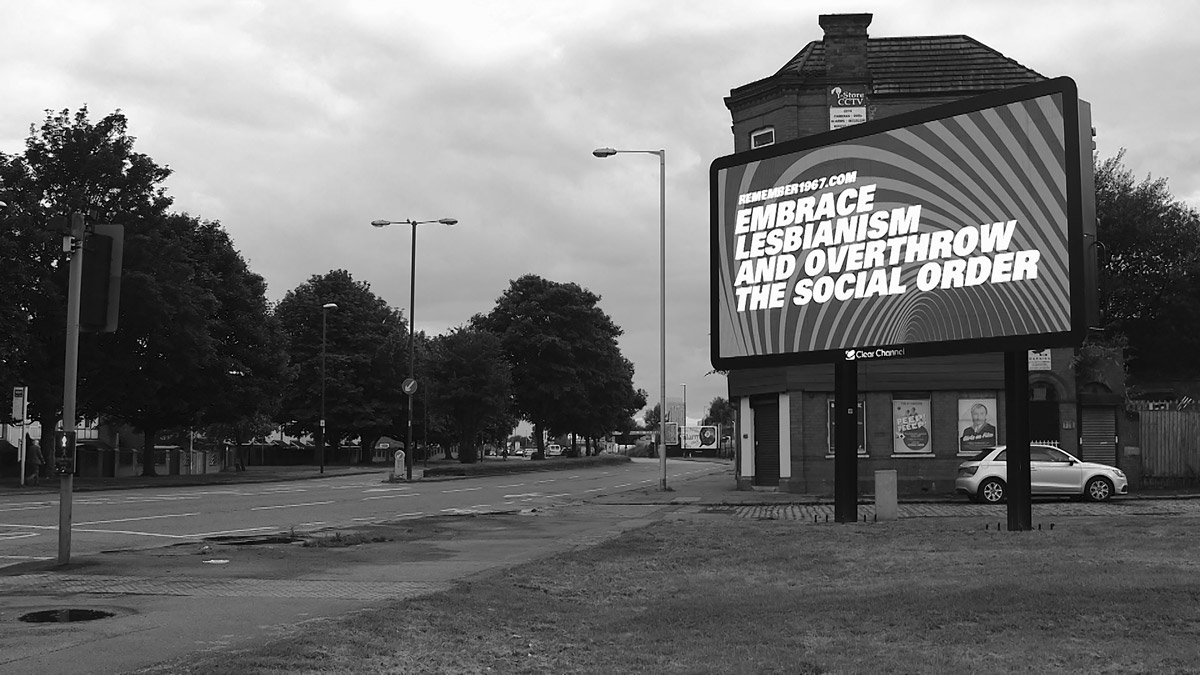We use the cookies _ga, _gat, _gid to collect anonymous data about how you use this site. OK.
Firrell has collaborated for several years with human rights campaigner Peter Tatchell,
NOTE
Peter Gary Tatchell (born 25 January 1952) is an Australian-born British human rights campaigner, best known for a lifetime of campaigning for LGBT+ rights around the world.
creating commemorative works to mark a series of significant LGBT+ milestones in the UK.
Remember 1967
is a series of six artworks commemorating 50 years since the Sexual Offences Act 1967 became law in England and Wales. With the passing of the act, gay and bisexual men in were able to have sexual relationships for the first time without being automatically criminalised.
Each artwork includes a different section of the same graphic vortex, redolent of 1960s op art. The works are presented in black and white (television was broadcast in the UK in colour for the first time in 1967 but colour TV sets were still rare).
The artist specified the large sans serif font Univers, drawn by Adrian Frutiger (1928 - 2015). Although the font was released by the French type foundry Deberny & Peignot in 1957, it reached the zenith of its popularity in the 1960s.
Remember 1967
re-presents the uncompromising demands for equality made by 60s activists that, in the artist’s view, still warrant attention today.
Both the gay liberation movement and the women’s movement agreed that genuine liberation could only be achieved by ‘eliminating the social pressures on men and women to conform to narrowly defined gender roles’. Masculinity as a strictly defined and enforced gender role was seen as the root cause of oppression. Activists noted that men, themselves, were similarly oppressed by the rigid enforcement of gender roles, especially where those men were unwilling or unable to conform to the hetero-macho male stereotype.
Many of Firrell’s socially engaged works acknowledge the significance of first and second wave feminism and, crucially, the radical lesbian feminism of the 1970s in which lesbianism was embraced as a political rather than a purely personal position.
The politics of lesbianism freed women absolutely from patriarchal power. Women still had access to masculine energy - if they wanted it - from ‘butches’ and ‘dykes’ but they could live absolutely free from male judgement and the requirements of the male gaze.
French feminism of the 1970s went a stage further, equating female gender with a different, lesser class of citizenship. This lesser citizenship, they argued, restricted access to certain benefits, entitlements and opportunities.
Though this class of citizenship was customarily applied to women, within the political framework of heterosexual male supremacy anyone who did not conform to the stereotype of masculinity was automatically less. Therefore women were automatically lesser citizens, by virtue of the fact that they were women. Gay men were automatically lesser citizens because they had fallen short of the heterosexual masculine gender role ideal.
By conceptualising their oppression as a different form of citizenship (rather than a difference of gender), French feminists highlighted the shared fortunes of women, gay men, lesbians, and people of colour.
In Firrell’s view, LGBT+ equality is built on the equalities fought for, and won, by women: straight, cisgender, transgender and lesbian. All equality movements stand on the shoulders of the women’s movement. If half of the world’s entire population can be oppressed, what hope is there for genuine minority groups?
The artist has been keen to acknowledge this debt, in part by addressing lesbian visibility, ensuring, for example, that the commemoration of the 1967 Sexual Offences Act also applauded lesbian visibility and freedom, even though lesbianism has never been directly outlawed in the UK.
As the public intellectual Susan Rudy put it, lesbians ‘found themselves undermined, but never outlawed, by the state’.



